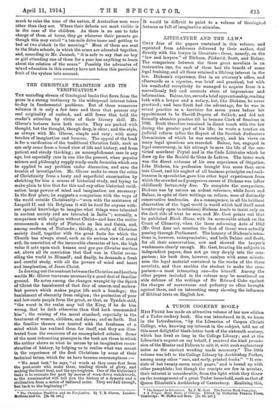LITERATURE AND THE LAW.*
ONLY four of the papers contained in this volume, and reprinted from addresses delivered by their author, deal directly with the lawyer in literature—those, namely, on the "law and lawyers" of Dickens, Pickwick, Scott, and Balzac. The comparison between the three great novelists is an instructive one, for each of them had the benefit of some legal training, and all three retained a lifelong interest in the law. Dickens's experience, first in an attorney's office, and afterwards as a reporter, was brief and practical, but with his wonderful receptivity he managed to acquire from it a marvellously full and accurate store of impressions and information. Balzac, too, served a brief apprenticeship, reading both with a lawyer and a notary, but, like Dickens, he never practised ; and here Scott had the advantage, for he was in actual practice as a barrister for seven years before his appointment to be Sheriff-Depute of Selkirk, and did not formally abandon practice till he became Clerk of Sessions in 1806. Scott therefore remained in direct touch with the law during the greater part of his life ; he wrote a treatise on judicial reform (after the Report of the Scottish Judicature Commission of which he was secretary), and his views on many legal questions are recorded. Balzac, too, engaged in legal controversy, in his attempt to save the life of the con- victed murderer Peytel and in the Code Litteraire which be drew up for the Societe de Gene do Lettrea. The latter work was the direct outcome of his own experience of litigation. Like Dickens, his profession brought him more than once into Court, and his neglect of all business principles and reck- lessness in speculation gave him other legal experiences from which the crowded and prosperous career of Dickens was (after childhood) fortunately free. To complete the comparison, Dickens was by nature an ardent reformer, while Scott and Balzae, in spite of their writings on reform, were of distinctly conservative tendencies. As a consequence, in all his brilliant observation of the legal world (a world which laid itself most bounteously open to criticism) Dickens tends to insist only on the dark side of what he sees, and Mr. Gest points out that he published Bleak House, with its memorable attack on the Court of Chancery, when the three reforming Acts of 1852 (Mr. Gest does not mention the first of them) were actually passing through Parliament. The honesty of Dickens's inten- Gone is, however, unimpeachable; and both Balzac and Scott, for all their conservatism, saw and showed the lawyer's weaknesses clearly enough. Mr. Gest, treating his subjects in independent papers, does not go very deeply into the com- parison ; his book does, however, analyse with some minute- ness the legal material contained in the works of the three novelists, and thus enables the student to make the com- parison—a most interesting one—for himself. Among the other papers included in the volume may be mentioned an able defence of the writings of Sir Edward Coke against the charges of narrowness and pedantry so often brought against them, and an interesting essay showing the influence of Biblical texts on English law.






































 Previous page
Previous page